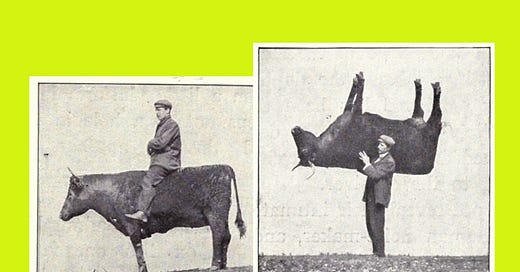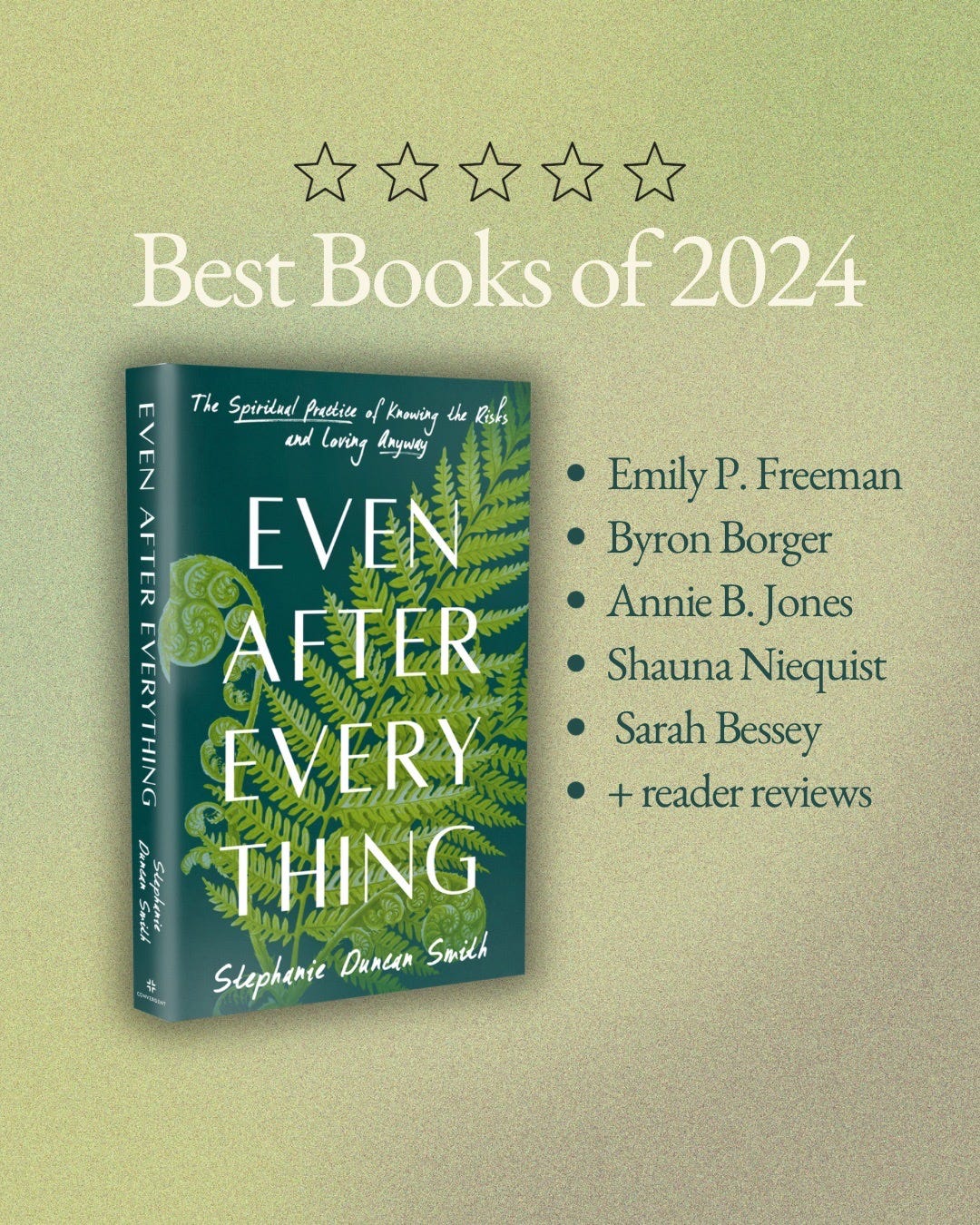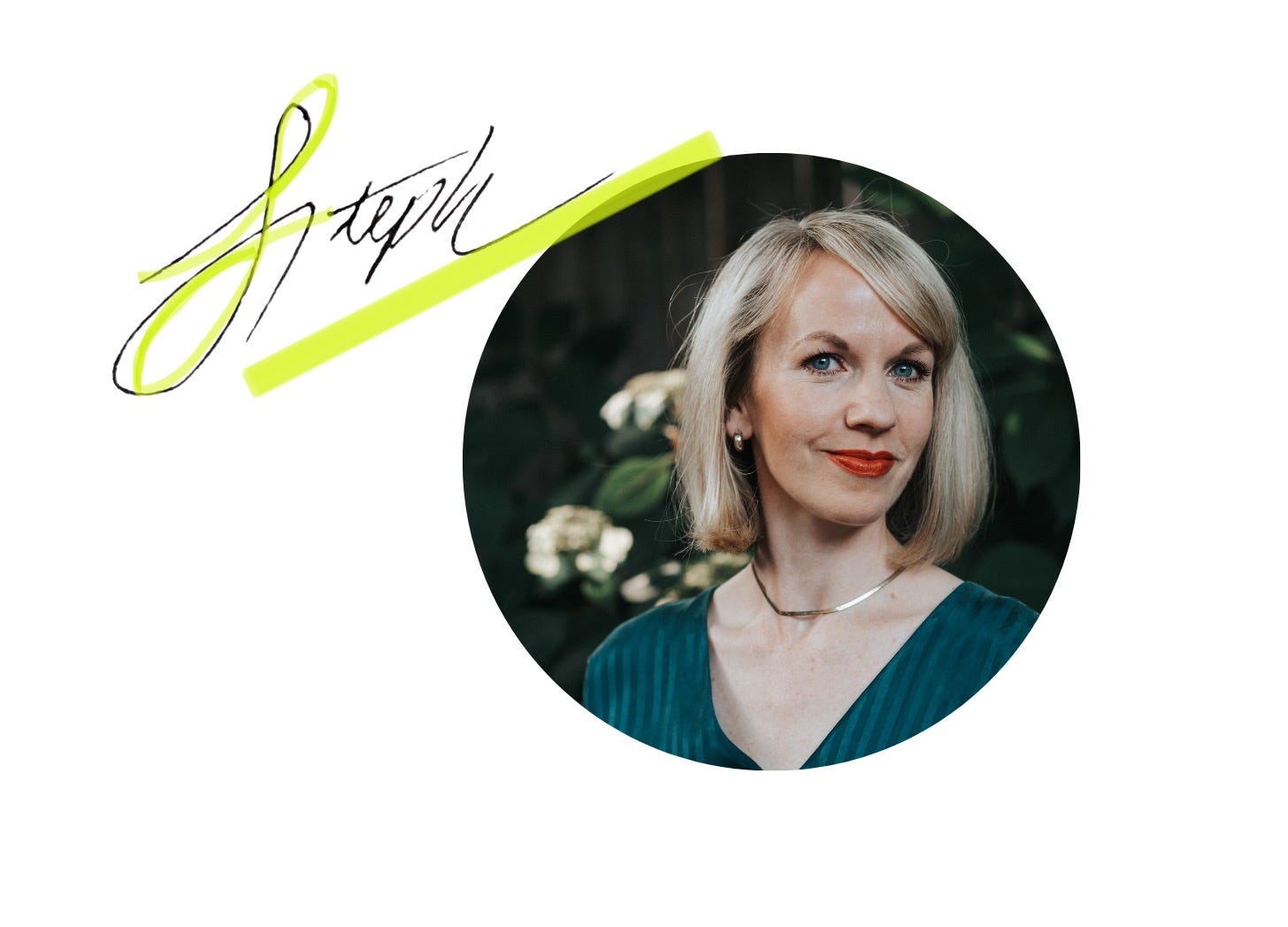🚫When telling it slant becomes telling it swiped
On plagiarism + personal practices to keep your creative integrity

Stealing other people’s creative work—yeah, we’re going there today. But first, a memo that today is the last day to get the Even After Everything ebook for 1.99! It’s been called one of the Best Books of 2024, and you can get the deal wherever you get your ebooks—today only!
Some time ago, in the privacy of our own home, I made a joke to my husband Zach—except he didn’t laugh. To my horror, he then gently reminded me that the joke was his, didn’t I remember that one time when he said it the first time? I did not, and was mortified. I had plagiarized my own family! I’ve never forgotten it. Too easily we can absorb the genius of someone else’s. Too easily the ego forgets the original source.
As writers, your greatest asset is your voice—a craft that flows from your very being. Plagiarism, then, is the act of impersonation that attempts to pass off someone else’s voice as their own. For anyone writing in public, plagiarism poses the specter of fearing your work will be taken from you and remixed with someone else’s name on it, as well as fearing you might—however inadvertently—forget an original source in the rock tumbler of our creative imaginations and make the very same mistake.
Telling it slant then becomes telling it shoplifted, swiped, web-scraped, and often, upsold.
Essentially, plagiarism is impersonating someone else’s intellectual property, blotting out the original source. Sometimes it’s word-for-word. Sometimes there’s no verbatim problem, but the concept has been copied. Sometimes it’s not even human minds playing the imitation game, but bots, such as the ongoing case of AI training on books without the consent of their authors. One AI researcher just this week called this “the greatest heist in human history,” to put not so fine a point on it!
I appreciate the definition as provided by Yale’s Writing Center for students (another realm where this happens on the regular, as my professor husband can woefully attest):
Plagiarism is the use of another’s work, words, or ideas without attribution. The word “plagiarism” comes from the Latin word for “kidnapper” and is considered a form of theft, a breach of honesty in the academic community.
The etymology here is telling. Whether it’s blatant copy-paste or petty theft, it’s theft. Curious, I looked up the etymology of “attribution,” which is such a lovely foil to this invasive cultural problem, and the Latin root tribuere means to “give, bestow, entrust.” What a study in contrast!
It’s the word “entrust” that’s especially interesting to me. As writers we are part of a sacred creative trust that long predates us and will long outlive us. None of us write nor publish ex nihilo—we are writing in conversation with every book on our shelves, every voice that’s spoken into our craft and storied comprehension. To attribute, to me, is to simply give voice to the voices that have given us so much creative wind beneath the wings. To show our humble place in this vast interstellar ecosystem, in where there is room enough for all of us.
So in a culture that is recklessly careless about attribution, how might writers take care?
We can’t control other people’s use or misuse of our words, of course, but we can take care of our part in the sacred creative trust to which we belong. If there’s one area in which we don’t want to get creative, it’s our integrity. Rather, we can take responsibility for our creative integrity, and by doing so, take good care of each other as literary citizens.
A few places to start:
Be meticulous about your own record-keeping.
Always attribute, even if just for your own personal note-taking. It’s far more difficult to return to months or years-old notes and rely on memory to tell you where that amazing quote came from. If you’re not sure, flag that, and fire up your search engine to see what you find.
My favorite personal practice here: often as I’m listening to a workshop, a sermon, or podcast, the speaker’s thoughts are generative to my own (this is how creativity happens—in conversation!) But to safeguard my notes from getting into the trouble of who said what, I simply jot an M— next to my own original spin-off thought, to mean, Myself—This is my voice, me speaking here.
If you look down the left margin of my notes, you’ll see my own personal em-dash scattered through, and this helps me delineate at a glance without any messy memory recalls or accidental fusing of ideas.
Be generous in showing your library.
My favorite thing reading a new book proposal or sample chapter is getting a sneak peek of a writer’s library. I want to know what their input sources are. You know that feeling when you go to a new friend or significant other’s house and see their bookshelves? What you read tells us who you are! So by all means, tell us.
Naming your influences is a beautiful way not only to be responsible in your citations, but to be generous in the creative cross-pollination that can happen when a writer sends their readers off to new fields, new trails. You can’t go wrong—generous attribution is good for writers, and it’s good for readers.
Be not omniscient.
The trickiest for last. In cases of suspected plagiarism, the uneasy truth is we can rarely know someone else’s intent nor integrity. More often than not, we simply do not have access to that interior information.
Everything is not always as it seems. Sometimes, what looks and smells like plagiarism might be original inspiration that germinated elsewhere independently on its own (the iconic example in my mind is forever the uncanny similarities between Liz Gilbert’s The Signature of All Things and Ann Patchett’s State of Wonder—you can read some of that story here, also in Gilbert’s Big Magic). Sometimes, what might show up clean on the plagiarism scan and be legally cleared might be downright conceptual theft.
An outlook that admits we are not omniscient is helpful. And still, if your gut is speaking, hear it out, and search it out. Don’t be afraid to advocate for your work or someone else’s if you suspect something is amiss. This might look like tagging the original writer of a viral post to say hey, I think this is hers, confronting a fellow writer with your concerns, having an open conversation with your publisher, or consulting a lawyer.
Name the rivers and rivulets.
I’m quite fond of this image from Jean Rhys:
“All of writing is a huge lake. There are great rivers that feed the lake, like Tolstoy or Dostoyevsky. And then there are mere trickles, like Jean Rhys. All that matters is feeding the lake. I don't matter. The lake matters. You must keep feeding the lake.”
Yes, do whatever you can to feed the lake. But don’t forget to name the rivers and the rivulets. Our literary citizenship is nothing less than a sacred trust. We’re all in this together, and we’re better for it when we act like it.
For more reading:
Is it plagiarism or zeitgeist? A most thoughtful piece by
. Don’t miss the conversation happening in the comments!Why would you steal my words? By
offers a nuanced take with some instructive examples of what might constitute copying, and what would not.Does this kind of thing bother you? How have you run into infringement issues of your creative work, and how have you addressed this?
Take heart and stay feisty,








Thanks for bringing more attention to this, Stephanie. It's too easy to do in this glutted world of content "creation."
Well, this is ironic. I thought L'Engle first wrote about feeding the lake as a writer. Was she referencing Rhys? WHAT IS HAPPENING. WHO'S ON FIRST?!